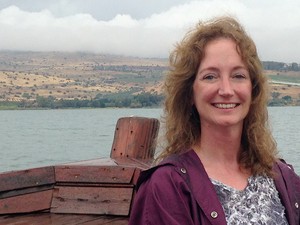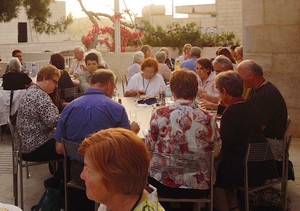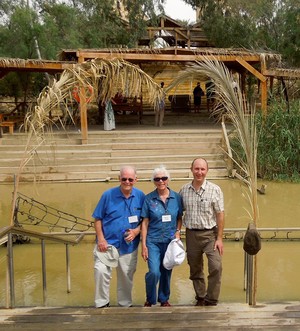The 2016 Mosaic of Peace conference, sponsored by the Presbyterian Peacemaking Program, is a 12-day conference that provides Presbyterians an opportunity to walk among the ancient stones in the Holy Land, where Jesus himself once walked. The itinerary includes visits to Jerusalem’s Western Wall, Bethlehem’s Christmas Lutheran Church and a boat trip on the Sea of Galilee—to name just a few.
Applications for attending the conference are due October 15, but will be accepted after that date if space is available. The conference begins with an overnight orientation session in Newark, N.J., on April 4, travel to Israel on April 5 and the return flight on Saturday, April 16. This year’s co-directors, Susan Orr, Presbyter for Mission and Education for the Presbytery of Genesee Valley in Rochester, N.Y., and Lawrence Bartel, pastor of Niccolls Memorial Presbyterian Church in Old Forge, N.Y., recently spoke with Presbyterian News Service about their experiences during the 2014 Mosaic of Peace conference, which they attended as participants with approximately 100 fellow Presbyterians.
Was there any particular experience that stood out to you or had the most impact?
Susan: There were so many, everywhere we went I was in awe and wonder. If I had to pick one, it would be worshipping on Sunday morning at the Evangelical Lutheran Christmas Church. We worshipped in the sanctuary filled with people of all nationalities, and even though the worship was conducted in Arabic, I’ve never listened so raptly to a sermon I couldn’t understand a word of yet could feel its power and passion. We sang common hymns in our own language and had worship bulletins in English. In communion, when we shared the Lord’s Supper together by intinction, it was a common bond and we all spoke the language of peace. It was deeply moving.

Susan Orr, 2014 MOP participant, on the Sea of Galilee boat tour. —Courtesy Susan Orr
Lawrence: The event Susan describes was an extraordinary experience, I kept thinking during that service “this is Pentecost.” To hear all those different languages was tremendous!
My moment, and there were so many if you ask me tomorrow I may have a different answer, was when we left Bethlehem. We visited a refugee camp and I’ll never forget what it was like to be welcomed into their school. They had a long piece of newsprint stretched out about 30 feet across pavement outside in their assembly area. I don’t speak Arabic, and few of the children spoke English, but we communicated with smiles, finger paint, gestures and symbols. We shared the same time and space and overcame the barriers that were between us with laughter. When we left the school our tour guide showed us the ancient area of Jericho where Joshua would have come, and I can remember thinking “this is so much smaller” than my impression. My youth storybook Bible illustrations made Jericho look like the biggest, most celestial city ever. I realized the context of Jericho at the time of Joshua was so different from what was seeded in my imagination. Travel to the Holy Land is vital for Christians, Jews and Muslims; to go to the places we hear about and that shape our faith yet discover our impressions of them are rooted in our imagination and not in present day reality helps us make informed opinions. I never travel to London or Paris expecting it to be like the time of Shakespeare or Louis XVI, but I think we travel to Jerusalem and Jericho expecting it to be like the time when Jesus walked and Joshua marched.
Has the 2014 trip impacted your life in an important or profound way?
Lawrence: Absolutely. First, it’s enhanced the interior spiritual journey that I believe we are about as people of faith—an interior journey that will never end. It’s deepened that and given it context. Another impact came from one of the orientation speakers who asked us to keep two things in mind when traveling to Israel and Palestine. She told us to “hold the tension” and “don’t give up hope.”
I found that advice important within the context of the headlines about Israel and Palestine. Hold the tension between what seem to be opposing viewpoints, don’t discard either one of them, and don’t give up hope. Live in the hope. That’s made a great impact on me.
Susan: If it didn’t touch our lives or change us profoundly we wouldn’t be going back and dedicating so much of our heart and soul in preparing the 2016 conference. I’ve been on Presbytery staff for 14 years and through that work and my own personal faith journey I’ve always understood as Christians we are called to be peacemakers. In many ways I feel like I’ve been striving for that, but being there made it real. When we hear about struggle and pray for so many painful, heartbreaking situations around the world we sometimes ask ourselves “what can I do?” Time and again we would meet or talk to people in the streets and ask “what can we do?” They would say, “Go home, share your experiences, and tell our story.” I can share my experience, but I want others to share that experience too. As Presbyterians we’re urged as Christians to visit the Holy Land and be a presence and witness for peace—that has changed me.
Upon your return, have you spread your message to other Presbyterians?

MOP participants enjoy a sunset dinner at the International Center of Bethlehem. —Lawrence Bartel
Lawrence: I’ve shared my experiences on the floor of the Presbytery, and was asked to lead worship and preach from the heart. It’s been awesome and a privilege to bring it into worship. One experience that was part of my journey of peace happened after the official conference; I walked from Nazareth to Capernaum, on what’s called the Jesus Trail. I walked for four days, through Galilee; the experience of traveling in a large group with great esprit de corps and then having the personal reflection for a few days afterward, where each day of the Jesus Trail I read a different gospel, was extraordinary. I find that coming back and being the pilgrim that returned, and sharing the pilgrim’s story of that entire experience from beginning to end and wanting to hear others’ stories provides a wonderful opportunity for conversation with people who are on their own peacemaking journey, whether it’s in the Holy Land or another area of seemingly intractable conflict. It’s been one my joys to come back to the congregation, community and Presbytery to share my story and listen to theirs.
Susan: I’ve had the pleasure of traveling throughout our Presbytery, which are about 65 churches in the greater Rochester and five-county area. I’ve deeply appreciated the opportunity to gather people together around an issue that is hard to talk about. Sometimes as “good Christians” we don’t want to have those hard conversations or argue or offend. Sometimes we don’t want to share how we feel about a situation; yet being able to bring people around my pictures and experiences, and integrate them into some worship materials in the context of our call as Christians has been a deep and meaningful experience for our Presbytery. The opportunity to have a difficult conversation and share our Christian love has been really amazing.
Should one be concerned for their safety in the Middle East?
Susan: As I’ve shared my travel stories safety is an issue raised every time. “Did you feel safe?” is a common question. I was never concerned for my safety. The trip planning is such that I knew where I was going to be at all times, and not once did I feel concern for my personal safety when I was there.
Lawrence: I’m right with you on the safety issue; I found myself very comfortable in the camaraderie of the group and the conference leadership is very responsive to safety concerns. There’s a lot of keeping your eyes open during the trip, and because the trip is so well planned there is no traveling alone or in small groups where one’s personal safety could be compromised. With safety concerns minimized it allowed us to have our eyes wide open to the historical significance—and present reality—to the place where we were instead of thinking about sensational headlines that we may carry with us.
What is the conference’s greatest impact or value?
Susan: That’s a tough one, because there are so many elements to the trip. As a large group we had access to speakers and places that I don’t think you would have if you went on your own or in a small group. All the experiences are culturally rich and I got to meet other Presbyterians from across the country, and that’s a rare opportunity.
What would you say to people to encourage them to participate in MOP 2106?
Lawrence: I ask those who are reading [this article] to come and walk with us. Walk with us across the ancient stones where Jesus walked in Jerusalem, where Jesus walked the temple, where he walked as a young man in Nazareth, as a teacher and rabbi along the Sea of Galilee, as he invited disciples to join him and learn from him and to change the world.
As Susan said, walk together to the table of communion with brothers and sisters from around the world, with Palestinian Christians. Walk with us to the river Jordan where we will dip our feet into the water and experience the renewal of baptism.
Both Orr and Bartel noted how well-prepared participants will be before the trip commences—not knowing enough about the region or its history should not keep anyone from enjoying the experience.
“It’s a professionally-run, very organized conference,” says Orr. “Everyone will be given tools to maximize their understanding and enjoyment of the trip. There are several flight options, so it’s flexible for anyone, including those who might want to stay a little longer after the conference ends or have specific needs.
-----
Registration is open for Mosaic of Peace 2016, which is made possible by gifts to the Peace and Global Witness Offering. For more information, including a proposed schedule and application, visit www.presbyterianmission.org/mosaicofpeace or call the conference registrar at 502-569-8820. Applications will be accepted after the October deadline as space is available.

